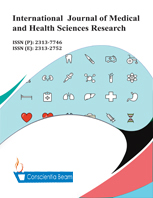Food Safety Knowledge, Attitude and Associated Factors of Food Handlers Working in Substandard Food Establishments in Gondar Town, Northwest Ethiopia, 2013/14
Abstract
Introduction: Food safety is an increasingly important public health issue to prevent food borne illnesses. The global incidence of food borne disease is difficult to estimate, but it has been reported that 2.1 million people died each year from diarrheal diseases attributed to contamination of food and drinking water. Objective: This study was conducted to assess food safety knowledge, attitude and associated factors of food handlers working in substandard food establishments of Gondar town, Northwest Ethiopia, 2013/14. Methods: Cross sectional study design was used. Four hundred three food handlers were taken randomly as study subjects and data were collected by face to face interview. Ordinal logistic regression model was fitted to analyze the predictor variables. Results: The overall level of food safety knowledge (high level - 47.40%, moderate level- 41.70% and low level - 10.90%) and attitude (positive - 31.80%, neutral - 65% and negative - 3.20%) were reported. Among the food handlers who had moderate or high level knowledge, only 85 (23.68%) of the handlers had deep knowledge and the rest have superficial knowledge. Educational status, food safety information, feedback from consumers, supervision by manager, food hygiene and safety training and attitude were identified as predictor variables of knowledge. Attitude was not statistically associated with any of the predictor variables. This is because of the aggregation of respondents in one categorical variable and hence, the analysis did not pass the assumption of ordinal and multinomial logistic regression. Conclusion: Compared to other similar studies, Low level of food safety knowledge and attitude were reported. Among the food handlers who had moderate or high level knowledge, the highest proportion of food handlers had superficial knowledge.

